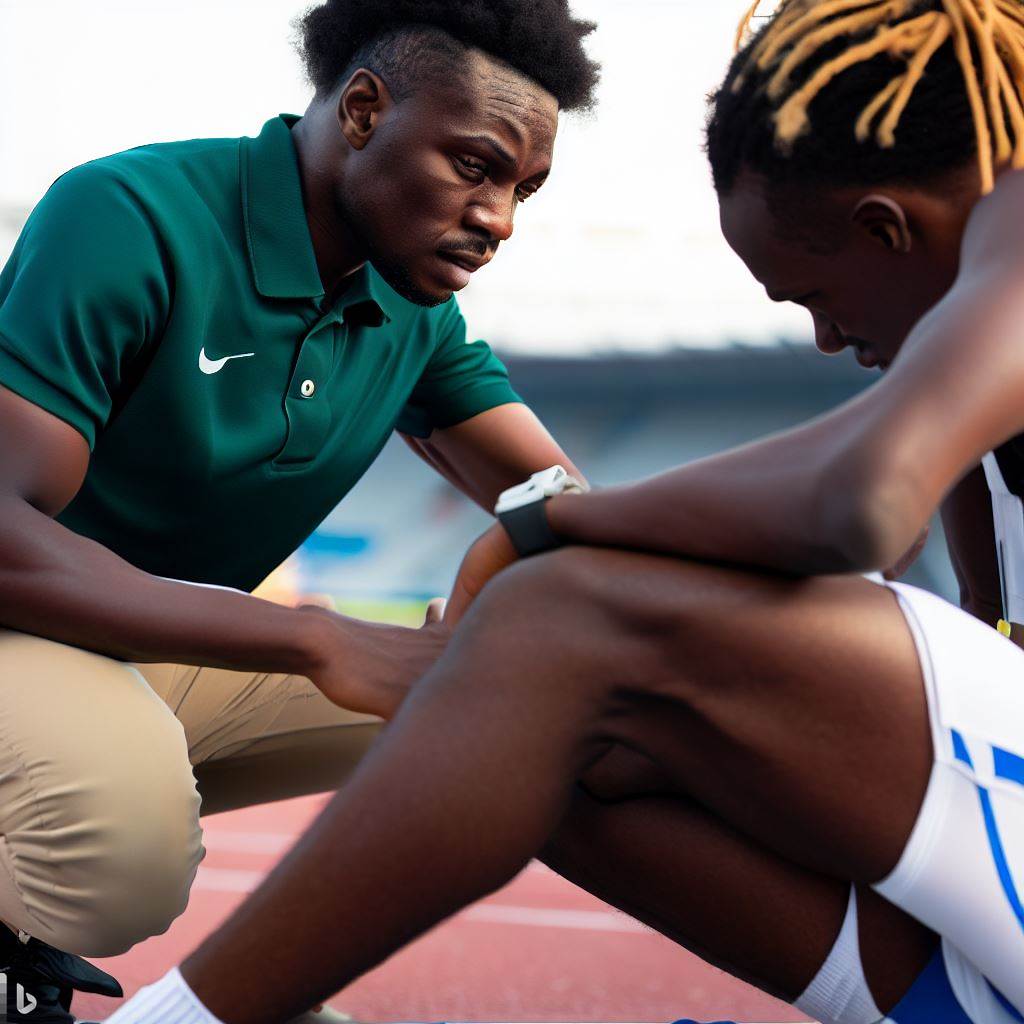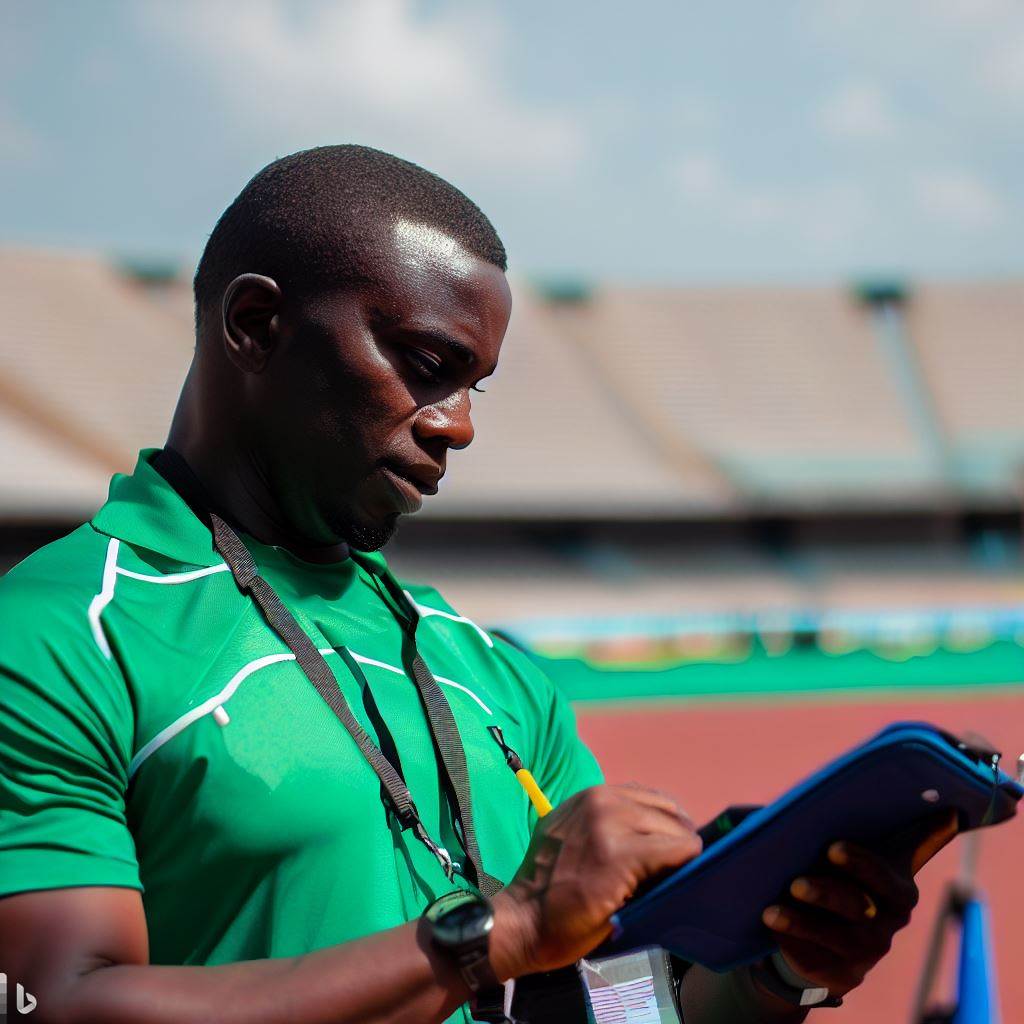Introduction
Assistant Coaches Impact in Nigerian Football: Unveil the crucial role played by these unsung heroes in shaping the nation’s soccer prowess.
Impact of assistant coaches in Nigerian football
In Nigerian football, assistant coaches play a crucial role in shaping team strategies and player development. They work closely with head coaches to implement tactical plans and analyze opponents.
These coaches provide valuable support in training sessions and during matches, helping to guide the team to success.
The significance of assistant coaches cannot be overstated, as they contribute to the overall performance of the team.
They bring their expertise and experience to the table, offering valuable insights and advice to both players and the head coach.
Assistant coaches in Nigerian football have a direct influence on the team’s performance, motivation, and growth.
Background information on the role and significance of assistant coaches in the sport
Their role goes beyond just assisting the head coach; they are instrumental in building team morale and fostering a positive team culture.
They work with individual players to enhance their skills, offering personalized training and guidance.
Additionally, they contribute to the tactical planning of the team, analyzing opponents and providing strategic input during matches.
The role of assistant coaches in Nigerian football is indispensable, and their impact can be seen in the success and achievements of teams.
Their presence elevates the sport, bringing diverse perspectives and expertise that enhance the overall quality of Nigerian football.
The Role of Assistant Coaches in Nigerian Football
Assistant coaches play a crucial role in Nigerian football, contributing to team success through their responsibilities, support for head coaches, and contributions to player development.
Here, we will discuss their primary duties, the importance of their role, and the ways in which they contribute to team success.
Primary Responsibilities and Duties of Assistant Coaches
- Assisting head coaches in developing game strategies and tactics.
- Conducting training sessions to improve players’ skills, fitness, and overall performance.
- Scouting and analyzing opponents to provide valuable insights for game preparation.
- Providing individual feedback and guidance to players to enhance their technical abilities.
- Assisting in creating lineups, substitutions, and game plans based on available resources.
- Assisting with team selection and player recruitment to ensure a balanced and competitive squad.
- Maintaining discipline and fostering a positive team culture through effective communication.
- Supporting head coaches during matches, providing real-time analysis and suggestions.
By shouldering these responsibilities, assistant coaches play a pivotal role in shaping the team’s performance.
Importance of Assistant Coaches in Supporting Head Coaches and Players
The role of assistant coaches extends beyond their specific duties.
They act as a bridge between head coaches and players, providing crucial support and fostering a cohesive team environment.
Their importance can be highlighted in the following ways:
- Reducing the workload of head coaches by assisting with administrative tasks and training sessions.
- Providing a different perspective during decision-making processes, enhancing the overall quality of team strategies.
- Acting as a conduit for effective communication between head coaches and players, ensuring clarity and understanding.
- Fostering a positive team environment by enforcing discipline, accountability, and camaraderie.
- Building strong relationships with players, earning their trust, and offering guidance both on and off the field.
The presence of assistant coaches is vital in nurturing a harmonious and supportive atmosphere within the team, leading to improved performance and morale.
Contributions of Assistant Coaches to Team Success
Assistant coaches play a critical role in contributing to the overall success of a team. Their input and impact can be observed in the following ways:
- Enhancing player development through personalized attention, feedback, and skill-building techniques.
- Implementing effective training programs that target weaknesses and enhance team strengths.
- Analyzing opponent strategies and providing valuable insights to help formulate successful game plans.
- Helping head coaches make informed decisions by gathering and analyzing statistical and performance data.
- Providing crucial support during matches by offering tactical suggestions, substitutions, and motivation.
- Building team unity and trust through effective communication and fostering strong player-coach relationships.
Assistant coaches are invaluable assets to Nigerian football, consistently contributing to team success through their tireless efforts and expertise.
In essence, assistant coaches in Nigerian football carry out various responsibilities, provide vital support to head coaches and players, and significantly contribute to overall team success.
Their understanding of the game, guidance, and ability to create a positive team environment make them indispensable in shaping the future of Nigerian football.
Historical Overview of Assistant Coaches in Nigerian Football
In Nigerian football, the role of assistant coaches has played a significant part in the development and success of teams over the years.
With a rich history in the sport, the contribution of assistant coaches cannot be overlooked.
Brief History of Assistant Coaching in Nigerian Football
The concept of assistant coaching in Nigerian football can be traced back to the early days of the sport in the country.
As the game gained popularity, teams recognized the need for additional support and guidance on the sidelines.
One of the earliest notable assistant coaches in Nigerian football was James Peters. He served as an assistant coach to the Nigerian national team during the 1940s and 1950s.
Peters was instrumental in the development of Nigerian football, and his expertise was greatly valued.
Over time, the role of assistant coaches became more formalized, with teams appointing dedicated individuals to support the head coach.
These assistant coaches provided valuable insights, tactical advice, and helped with training sessions.
Key Figures and Notable Assistant Coaches
Several key figures have left a lasting impact as assistant coaches in Nigerian football.
Joe Erico, a former goalkeeper for the national team, became renowned for his role as an assistant coach under Clemens Westerhof.
Under Westerhof’s guidance, Erico contributed significantly to the success of the Nigerian national team, including their historic victory in the 1994 African Cup of Nations.
His tactical awareness and ability to motivate players were crucial in achieving that milestone.
Another notable figure is Daniel Amokachi, who served as an assistant coach to Stephen Keshi during his tenure as head coach of the Super Eagles.
Amokachi’s playing experience and understanding of the game added immense value to the team’s preparations and performances.
Samson Siasia is also worth mentioning, as he served as an assistant coach during the golden era of Nigerian football in the 1990s.
His expertise and input were instrumental in the team’s success, including their Olympic gold medal in 1996.
Evolution of the Role of Assistant Coaches
Over the years, the role of assistant coaches has evolved in Nigerian football. Initially, they were primarily seen as supporting figures, providing guidance and assistance to the head coach.
However, as the game became more complex and demanding, the responsibilities of assistant coaches expanded.
They now play a more active role in strategy development, team management, and player development. Assistant coaches often specialize in specific areas, such as defensive tactics or set-piece strategies.
The increased focus on data analysis and sports science has further shaped the role of assistant coaches.
They work closely with analysts and fitness experts to devise game plans, assess opponents, and enhance the overall performance of the team.
Furthermore, assistant coaches are now recognized as vital successors to the head coach.
Many successful head coaches in Nigerian football, such as Christian Chukwu and Gernot Rohr, started their careers as assistant coaches before taking on leadership roles.
In a nutshell, the impact of assistant coaches in Nigerian football cannot be overstated.
From the early pioneers to the modern-day specialists, their contributions have been invaluable in shaping teams and achieving success.
As the game continues to evolve, assistant coaches will play an increasingly crucial role in guiding and inspiring Nigerian football towards new heights.
Read: Nurturing Talent: Youth Coaching in Nigeria
Importance of Assistant Coaches in Skill Development
Assistant coaches play a vital role in the development and improvement of players in Nigerian football.
Contribution to Player Development
Assistant coaches are instrumental in nurturing young talents and helping established players reach their full potential.
They provide guidance, support, and individualized training to players, working closely with them to identify strengths and weaknesses.
Through consistent feedback and evaluation, assistant coaches help players refine their skills, making them more proficient in their positions.
Furthermore, assistant coaches act as mentors, inspiring and motivating players to push themselves beyond their limits.
Enhancing Technical Skills
Assistant coaches play a significant role in enhancing the technical skills of players.
They conduct specialized training sessions focused on improving dribbling, passing, shooting, and other essential techniques.
By providing players with the necessary drills and exercises, assistant coaches enable them to develop better control, accuracy, and speed.
These improved technical skills translate into more efficient gameplay and help players stand out among their peers.
Strengthening Tactical Knowledge
Assistant coaches contribute immensely to players’ understanding and application of tactical strategies.
They analyze opponents’ playing styles, devise game plans, and impart tactical knowledge to players.
By explaining the importance of positioning, movement, and teamwork, assistant coaches enable players to make better decisions on the field.
This enhanced tactical awareness results in improved game reading, anticipation, and overall performance.
Examples of Successful Assistant Coaches
Several assistant coaches in Nigerian football have played a pivotal role in player development.
One notable example is Yusuf Salisu, who served as an assistant coach for the Nigerian national team.
Salisu’s expertise in defensive techniques and his ability to mentor young defenders significantly improved their skills.
Another example is Florence Omagbemi, who served as an assistant coach for the Nigerian women’s national team.
Omagbemi’s contributions in developing attacking strategies and nurturing young talents led the team to several successful tournaments.
These examples demonstrate the crucial role assistant coaches play in the growth and success of players.
To sum it up, assistant coaches have a significant impact on skill development in Nigerian football.
They contribute to player development, enhance technical skills, strengthen tactical knowledge, and inspire overall performance.
Successful assistant coaches like Yusuf Salisu and Florence Omagbemi serve as inspirations for aspiring coaches and players.
Their dedication and expertise have undoubtedly shaped the Nigerian football landscape, producing skilled and talented players.
Read: Educational Paths for Nigerian Strength Coaches

Mentorship and Leadership by Assistant Coaches
Mentoring stands as a cornerstone of assistant coaching within Nigerian football, with assistant coaches assuming pivotal roles in the development of emerging talents.
These coaches offer not just tactical insights, but also guidance, unwavering support, and motivational sparks to ignite the potential within young players.
They embody the essence of role models, becoming beacons of positive influence both on and off the hallowed grounds of the football pitch.
The impact of assistant coaches resonates deeply in their ability to inspire through sheer dedication and an unyielding work ethic.
In doing so, they sow the seeds of essential values such as discipline, respect, and teamwork in the impressionable minds of the rising stars.
Their wisdom and experiences, generously shared, serve as the nourishing soil that enables players to flourish and reach their zenith.
The mentorship they offer is akin to a sculptor shaping raw talent into a masterpiece.
Assistant coaches act as compasses, steering young players through the tempestuous seas of professional football.
Their guidance extends beyond the pitch, delving into crucial decisions regarding careers and futures.
They offer an unwavering hand of support during both victories and setbacks, imparting the life skills of resilience and mental fortitude.
In addition, these mentors cultivate a culture of growth, urging players to perpetually strive for excellence.
They are not just purveyors of knowledge but celebrants of achievements and invaluable sources of lessons in the face of adversity.
Furthermore, assistant coaches are guardians of players’ well-being, ensuring a balanced life amidst the pressures of professional football.
Through these bonds of mentorship, they forge profound relationships built on trust.
Publish Your Professional Profile, Business or Brand
Showcase your expertise, gain trust, and boost visibility instantly on Professions.ng.
Publish NowUltimately, the profound influence of assistant coaches transcends mere tactical prowess.
They are architects of character, shapers of destinies, and custodians of the future of Nigerian football. With unwavering dedication and a commitment to excellence, they inspire generations to come.
Their legacy is one of discipline, respect, and ceaseless self-improvement, setting a high bar for all to aspire to.
Tactical Contributions by Assistant Coaches
In the dynamic and ever-changing world of football, assistant coaches play a crucial role in supporting head coaches and ensuring team success.
Beyond their administrative duties, these individuals make significant tactical contributions during training sessions and matches.
Strategic and Tactical Input during Training Sessions
- Assistant coaches actively participate in training sessions, providing strategic and tactical input to enhance team performance.
- They collaborate with head coaches in developing training drills and exercises that focus on specific aspects of gameplay.
- During training, assistant coaches closely observe players’ technique, positioning, and decision-making, providing immediate feedback and suggestions for improvement.
- They help instill discipline and teamwork among players by emphasizing the importance of executing tactical instructions consistently.
- Assistant coaches also contribute to fostering a positive and competitive training environment that motivates players to excel.
Role in Analyzing Opponents and Providing Valuable Insights
- Assistant coaches play a critical role in analyzing opponents before matches, providing valuable insights based on their extensive knowledge.
- They study opponents’ previous games, identify patterns, and analyze their strengths and weaknesses.
- By evaluating opponents’ playing style, formations, and key players, assistant coaches help develop effective strategies for gaining a competitive edge.
- They work closely with the technical staff to devise game plans that exploit the weaknesses of the opposing team.
- Assistant coaches provide players with detailed information about the opponents’ tactics, enabling them to adapt during the match.
Influence on Game Plans and Strategies
- Assistant coaches have a significant influence on shaping game plans and strategies to secure positive outcomes in matches.
- They actively participate in pre-match discussions, where they propose tactical adjustments and modifications based on their analysis.
- Assistant coaches contribute to formulating offensive and defensive strategies, suggesting various approaches to exploit opponents’ vulnerabilities.
- During matches, they communicate with players on the sidelines, offering instructions and guidance to adapt to changing circumstances.
- In specific instances, assistant coaches have profoundly influenced game outcomes by introducing substitutions or making critical tactical decisions.
Essentially, assistant coaches in Nigerian football are not mere spectators on the sidelines but essential contributors to the team’s tactical success.
Through their involvement in training sessions, analysis of opponents, and strategic input, they provide invaluable support to head coaches and players alike.
Their ability to assess the game’s nuances, develop effective strategies, and make game-changing decisions has a significant impact on Nigerian football.
Read: Women in Sports Leadership: Athletic Directors in Nigeria
Collaborative Work with Head Coaches
Strong partnerships between head coaches and assistant coaches are crucial for the success of a football team.
Effective communication and trust serve as vital components in fostering successful teamwork.
Importance of Strong Partnerships
- Sharing Responsibilities: Assistant coaches support the head coach by sharing responsibilities in training sessions, tactical analysis, and player development.
- Expertise and Perspective: Assistant coaches bring their unique expertise and perspectives, enhancing the overall coaching approach.
- Targeted Focus: By dividing tasks, head and assistant coaches can focus on specific areas of the game, leading to a more comprehensive coaching strategy.
- Collaboration and Learning: Working together fosters collaboration and a continuous learning environment, benefiting both coaches.
Effective Communication and Trust
- Clear Instructions: Assistant coaches need to effectively communicate the head coach’s strategies and tactics to players.
- Feedback and Evaluation: Regular communication between coaches enables constructive feedback, leading to player progression.
- Mutual Understanding: Trust is developed through open and honest communication, ensuring coaches work towards a common goal.
- Unity and Cohesion: A strong partnership creates a positive team environment, encouraging unity among staff and players.
Examples of Successful Coaching Partnerships in Nigerian Football
- Clemens Westerhof and Jo Bonfrère: The coaching duo led Nigeria to victory in the 1994 Africa Cup of Nations, showcasing a remarkable collaborative effort.
- Gernot Rohr and Salisu Yusuf: Their partnership as head and assistant coach of the Super Eagles helped Nigeria qualify for the 2018 FIFA World Cup.
- Thomas Dennerby and Edwin Okon: Together, they guided the Nigerian women’s national team to win the African Women’s Championship in 2014 and 2016.
- Emmanuel Amunike and Alloy Agu: The successful collaboration of these coaches helped the Nigerian U-17 team secure a record fifth FIFA U-17 World Cup title in 2015.
In review, assistant coaches play a vital role in Nigerian football through their collaborative work with head coaches.
Strong partnerships, effective communication, and trust contribute to successful teamwork.
Several examples in Nigerian football demonstrate the impact an effective coaching partnership can have on achieving remarkable results.
Read: Becoming an Athletic Trainer in Nigeria: A Step-by-Step Guide
Challenges Faced by Assistant Coaches in Nigerian Football
Assistant coaches in Nigerian football face numerous obstacles and difficulties in their roles.
These challenges can hinder their impact and growth within the football system. However, there are possible solutions that could be explored to overcome these challenges.
- Lack of Recognition: Assistant coaches often struggle to gain recognition for their contributions, as the focus is primarily on the head coach. This lack of recognition can demotivate assistant coaches and hinder their career progression.
- Limited Authority: Assistant coaches may face challenges in exercising their authority and decision-making power. In many cases, the final say rests with the head coach, limiting the impact and autonomy of assistant coaches.
- Inadequate Resources: Assistant coaches often lack the necessary resources, such as training facilities, equipment, and support staff, to effectively carry out their responsibilities. This can hinder their ability to develop players and implement effective strategies.
- Limited Opportunities for Advancement: Assistant coaches may find it difficult to secure head coaching positions, as opportunities for advancement are scarce. This lack of career progression can lead to frustration and stagnation within the profession.
- Communication and Language Barriers: Nigerian football teams often consist of players and staff from diverse backgrounds. Assistant coaches may face challenges in effectively communicating and building rapport due to language barriers, hindering their impact on the team.
- Financial Constraints: Assistant coaches in Nigerian football often face financial challenges, with low salaries and irregular payment schedules. This financial strain can affect their motivation and commitment to their roles.
Possible solutions to overcome these challenges
- Recognition and Appreciation: Football stakeholders, including clubs, federations, and fans, should acknowledge and appreciate the contributions of assistant coaches. This recognition can boost their morale and provide motivation for continued growth.
- Empowering Assistant Coaches: Head coaches should empower assistant coaches by involving them in decision-making processes and giving them more responsibilities. This would allow them to showcase their abilities and have a greater impact on the team.
- Investment in Resources: Football institutions should invest in adequate resources for assistant coaches, such as training facilities, equipment, and support staff. Providing these resources will enable them to carry out their duties effectively and facilitate player development.
- Mentorship and Development Programs: Establishing mentorship programs and development initiatives for assistant coaches can enhance their skills and knowledge. These programs could be conducted by experienced head coaches or football associations.
- Language and Communication Training: Assistant coaches should be provided with language and communication training to overcome language barriers. This would enable them to effectively communicate with players and staff from different backgrounds.
- Fair Remuneration Packages: Football associations and clubs should ensure that assistant coaches receive fair remuneration packages that reflect their contributions. Regular and timely payment schedules should also be implemented to reduce financial stress.
Overall, assistant coaches in Nigerian football face various challenges that can hinder their impact and growth.
However, by recognizing their contributions, empowering them, investing in resources, providing mentorship programs, addressing language barriers, and ensuring fair remuneration, these challenges can be overcome.
By addressing these challenges, the role of assistant coaches can be elevated, leading to a more successful and vibrant football system in Nigeria.
Read: Becoming an Assistant Coach in Nigeria: A Guide
Conclusion
The impact of assistant coaches in Nigerian football cannot be underestimated.
They play a crucial role in providing support and guidance to the head coaches, improving the overall performance of the team.
The blog post highlighted the various ways in which assistant coaches contribute to the success of Nigerian football.
From tactical analysis and training sessions to player development and motivation, their involvement is invaluable.
Assistant coaches bring a wealth of experience, knowledge, and expertise to the team. They assist in decision-making and help in managing the players on and off the field.
Moreover, the significance of assistant coaches extends beyond the team’s success.
They serve as role models and mentors to aspiring coaches, inspiring a new generation of football leaders.
In the future, the impact of assistant coaches is expected to grow even further. As Nigerian football continues to evolve, their role in shaping the sport will become increasingly vital.
To maximize the potential of assistant coaches, it is essential for clubs and football associations to recognize their value and provide adequate support and resources.
Finally, assistant coaches are a fundamental part of Nigerian football, and their contribution should not be overlooked.
With their expertise and dedication, they have the power to revolutionize the sport and nurture future talents.




